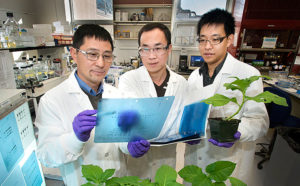Research Focus
Phenylpropanoid metabolism generates C6-C3 skeletons that are used to build a diverse array of aromatic compounds, including many methanolic soluble small molecule metabolites such as flavonoids, stilbenes, coumarins, and lignans, and the intractable cell wall polymer lignin. As a major structural component of secondary cell wall, lignin imparts strength, rigidity and water impermeability to plant vasculature, assuring the conductance of water and nutrients. The lignified secondary cell walls, representing the bulk biomass of terrestrial plants, are the most abundant renewable raw materials for producing liquid biofuels and bio-based chemicals. However, the presence of lignin in the cell walls becomes a formidable obstacle in biological utilization of cellulosic fibers. A better understanding of the biochemical and molecular mechanisms controlling carbon skeleton channeled into phenylpropanoid-lignin metabolism is critical for tailoring cellulosic feedstocks’ processability for the purpose of producing renewable biofuels and bio-based products.
The research focus of my group centers on phenylpropanoid-lignin biosynthesis and the underlying regulatory mechanisms by which the plants employed to control the synthesis processes. We direct our researches to addressing the following questions: How the cell wall related phenolics are synthesized, delivered and incorporated into the cell walls; how their synthesis, deposition and assembly processes are regulated; and how lignification affects the structure and function of the cell walls. Moreover, we are applying our knowledge gained from fundamental studies to develop effective strategies to manipulate lignification and phenolic synthesis, thereby, lowering the recalcitrance of cellulosic feedstocks and producing the desired metabolites.
Projects
- Manipulation of phenylpropanoid-lignin biosynthesis and composition, and stack biomass traits in energy crops to reduce recalcitrance and increase the content of the most desirable fuel precursors
- Evaluation and mechanistic exploration of the effects of phenylpropanoid metabolic engineering on energy crops’ growth, development, and stress response
- If necessary, conducting field trial experiments of the engineered crops
Featured Media
Scientists ID Enzyme for Making Key Industrial Chemical in Plants
Tailoring levels of enzyme has many potential applications, including renewable production of p-hydroxybenzoic acid, improved biofuel production and/or timber durability, and a path for long-term carbon sequestration.
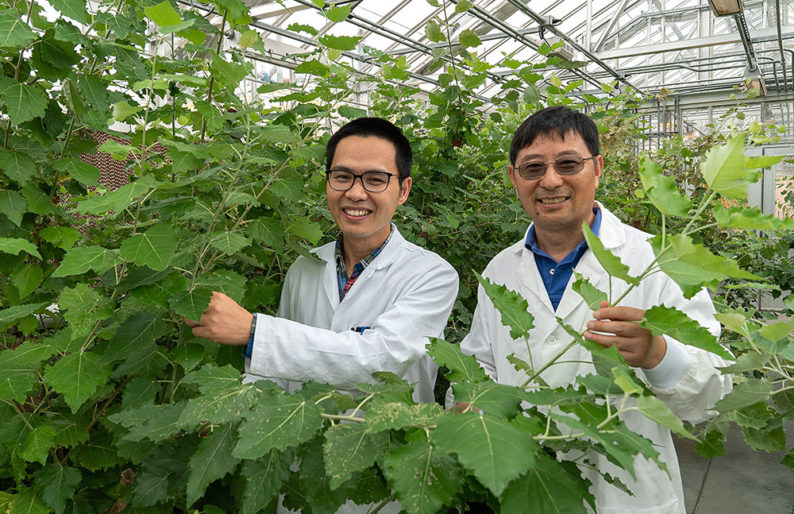
‘Electron Shuttle’ Protein Plays Key Role in Plant Cell-Wall Construction
Controlling the flow of electrons by targeting shuttle proteins could be a new strategy for guiding plants to make desired products.
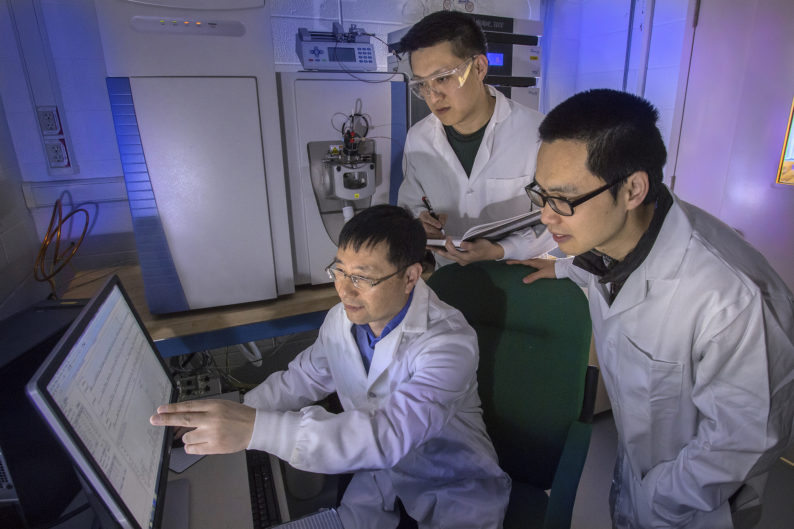
New Details of Molecular Machinery that Builds Plant Cell Wall Components
Study reveals how a membrane protein within plant cells serves as a scaffold to organize three key enzymes involved in building the cell’s exterior support.
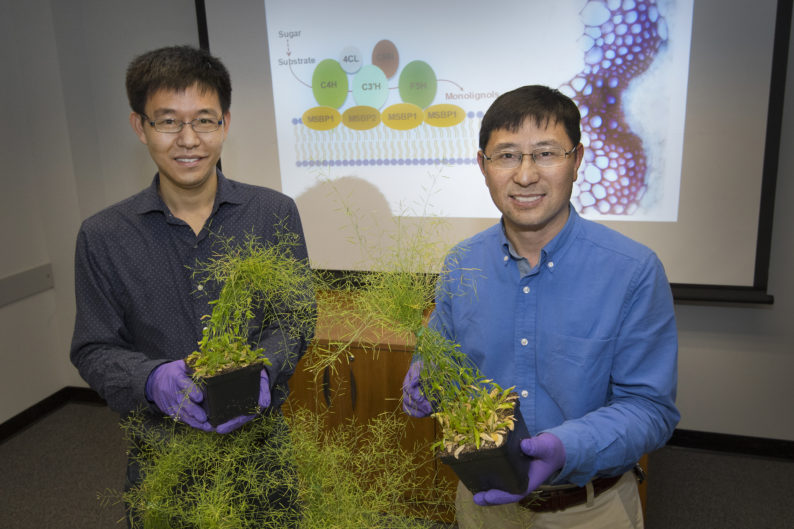
Brookhaven National Laboratory’s Top-10 Science Successes of 2016
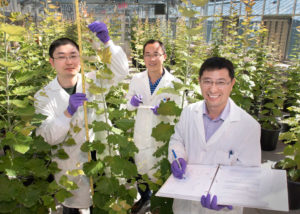
Study Shows Trees with Altered Lignin are Better for Biofuels
Fundamental enzyme study leads to increased access to bioenergy feedstocks and improves ethanol yield by modifying plant cell wall structures.
Roots to Shoots: Hormone Transport in Plants Deciphered
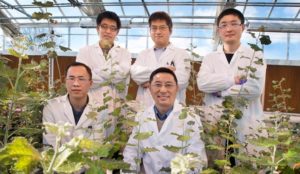
Enlisting Cells’ Protein Recycling Machinery to Regulate Plant Products
Scientists Create Low-Lignin Plants with Improved Potential for Biofuel Production
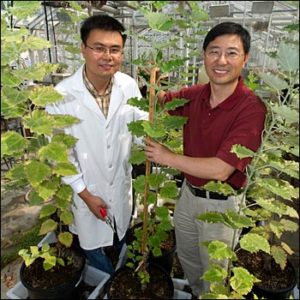
Study Offers Insight into Delicate Biochemical Balance Required for Plant Growth
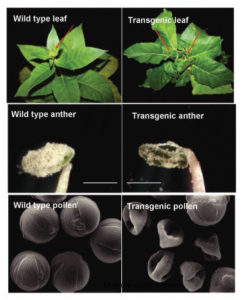
Featured Publications
- “Monolignol acyltransferase for lignin p-hydroxybenzoylation in Populus,” Nature Plants (2021)
- “Arabidopsis SnRK1 negatively regulates phenylpropanoid metabolism via Kelch domain-containing F-box proteins,” New Phytologist (2020)
- “Cytochrome b5 is an obligate electron shuttle protein for syringyl lignin biosynthesis in Arabidopsis,” Plant Cell (2019)
- “The scaffold proteins of lignin biosynthetic cytochrome P450 enzymes,” Nature Plants (2018)
- “A Proteolytic Regulator Controlling Chalcone Synthase Stability and Flavonoid Biosynthesis in Arabidopsis”, Plant Cell (2017)
- “The MYB107 transcription factor positively regulates suberin biosynthesis”, Plant Physiol. (2017)
- “Enhancing digestibility and ethanol yield of Populus wood via expression of an engineered monolignol 4-O-methyltransferase”, Nature Communications (2016)
- “Engineering a monolignol 4-O-methyltransferase with high selectivity for the condensed lignin precursor coniferyl alchohol”, J. Biol. Chem. (2015)
- “Down-regulation of kelch domain-containing F-box protein in Arabidopsis enhances the production of (poly)phenols and tolerance to UV-radiation”, Plant Physiol. (2015)
- “Arabidopsis ABCG14 protein controls the acropetal translocation of root-synthesized cytokinins”, Nature Communications (2014)
- “Arabidopsis kelch repeat F-box proteins regulate phenylpropanoid biosynthesis via controlling the turnover of phenylalanine ammonia-lyase”, Plant Cell (2013)
- “Characterization and ectopic expression of a Populus hydroxyacid hydroxycinnamoyltransferase”, Mol. Plant (2013)
- “An engineered monolignol 4-O-methyltransferase depresses lignin biosynthesis and confers novel metabolic capability in Arabidopsis”, Plant Cell (2012)
- “Acetylesterase-mediated deacetylation of pectin impairs cell elongation, pollen germination, and plant reproduction”, Plant Cell (2012)
- “Engineering monolignol 4-O-methyltransferases to modulate lignin biosynthesis”, J. Biol. Chem. (2010)
- “A hydroxycinnamoyltransferase responsible for synthesizing suberin aromatics in Arabidopsis”, Proc Natl Acad Sci USA (2009)
- “BAHD superfamily of acyl-CoA dependent acyltransferases in Populus and Arabidopsis: Bioinformatics and gene expression”, Plant Mol Biol (2009)

